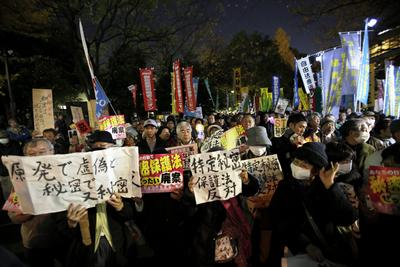Public interest in the now-State Secrets Law had soared in recent weeks, helped in part by ill-timed comments from the main ruling party’s Secretary General comparing protestors with terrorists.
The Law was passed in record time, only because the government was able to use its numbers to cut off debate in both houses. Despite last-minute attempts to run out the clock by opposition parties, which took a resolute position against the Law only after the strength of public opposition became clear, it was finally rammed through at close to midnight.
Before voting against the Law, opposition parties initially negotiated with the ruling bloc on its drafting, and did manage to extract some concessions. Some of these concessions were more helpful than others.
One opposition party, the Japan Restoration Party (JRP), scored a spectacular ‘own goal’ by including a provision that automatically removes the power to classify documents as ‘secret’ from any agency that has not made a classification decision within five years of the Law’s enactment. Yet rather than limiting classification, this will likely have the reverse effect, leading to more classification as agencies fight to keep these powers in reserve. The JRP had sought to reduce the number of agencies to which the Law applies altogether (it remains unclear why, for example, the Ministry of Agriculture or the Consumer Affairs Agency need the power to declare state secrets). Instead, in addition to the five-year rule, the prime minister ‘may’ now (but, note, not ‘must’) also remove classification powers from agencies if advised by ‘eminent persons’ that such powers are unneeded. Again, this too is likely to act as an incentive for agencies to classify more documents.
The price for this ‘victory’ by the JRP is that documents can now be classified for up to 60 years, instead of 30 years as under the original government proposal.
At least one of the Law’s more ambiguous terms, ‘security’, has been defined, albeit elliptically, as ‘securing the safety of the state and the people against external incursions on the national existence’. The wording of one particularly draconian penalty provision — allowing imprisonment of up to 10 years for ‘improperly accessing’ classified documents — has also been tightened to better clarify that it is aimed at espionage, rather than investigative journalism. However, there is little else in the Law from which journalists can take comfort. Significantly, the wide definitions of what types of information may be classified remain unchanged.
One of the key concerns in relation to the bill when introduced was the lack of any effective third-party oversight of classification decisions. The Law now makes the prime minister responsible for oversight. After setting overall classification standards in consultation with ‘eminent persons’, the prime minister must monitor the application of the standards by agencies, and report to the eminent persons’ group on an annual basis. Yet the Cabinet Secretariat, which acts as the prime minister’s personal staff, is already heavily overstretched. The notion that either it or the eminent persons’ group can effectively monitor classification of thousands of documents by several dozen agencies each year is farcical.
To this end, the Law also commits the government to ‘consider’ establishing an independent oversight panel, as has been widely reported. Such a panel, however, would only be responsible for overseeing the setting of standards, not individual classification decisions.
Thus the position under the Law remains very much as before. On no reasonable interpretation of the current provisions — however broad — could an agency seek to designate as state secrets documents that, for example, reveal nuclear regulators’ failure to adequately regulate the Fukushima Nuclear Power Plant. But, absent effective third-party oversight, the temptation for agencies to classify away politically embarrassing information will simply be too great. With vague penalty provisions and no whistleblower exemptions or proper shield laws to protect civil servants, the probability of such misclassification being exposed is less likely still.
So where to now? The next Japanese election is still three years away, and so far it seems unlikely that a more pro-transparency party would win. Barring a major international incident that exposes the Law’s inadequacies, the ruling parties will have few incentives to moderate it themselves.
For opponents of the Law, this leaves only the prospect of a constitutional challenge. The potential for infringement of the constitutionally protected freedom of the press, or the nascent ‘right to know’, is obvious. However, the Supreme Court does not give advisory opinions, and has traditionally applied the rules of standing in constitutional cases quite narrowly. It is, therefore, probable that the first opportunity for constitutional challenge with the country’s highest court will be when the first prosecution is brought under the Law.
Even then, the Court has tended to treat defence and security matters as ‘political questions’ and refused to rule on them — or at least to decide beyond narrow procedural points. If it follows past form on this occasion, the State Secrets Law may well be a feature of the Japanese legislative landscape for many years to come.
Joel Rheuben is an Australian solicitor pursuing postgraduate studies at the Faculty of Law, University of Tokyo.
A shorter version of this article was originally published here on freedominfo.org. An English-language overview of the bill first submitted in November is available here.

